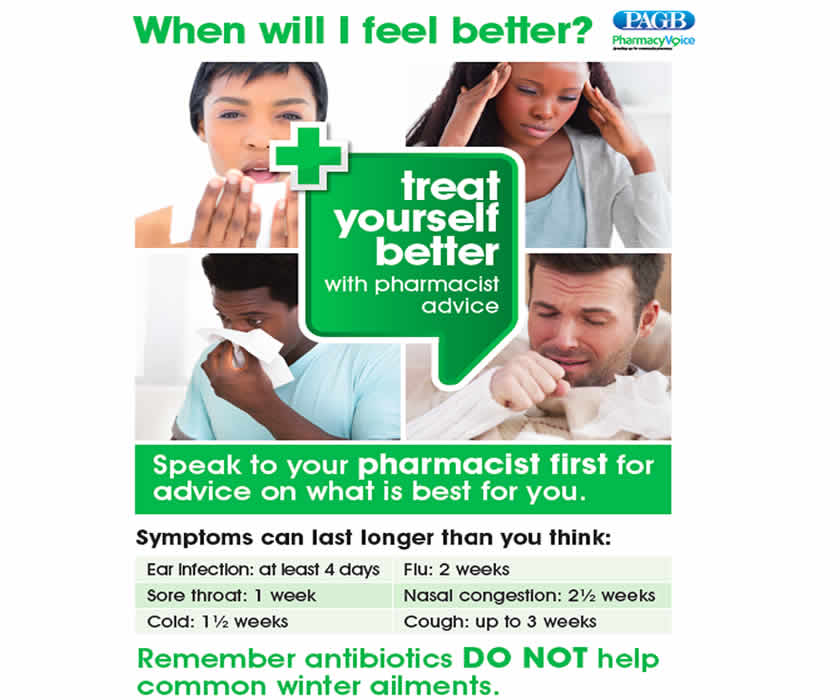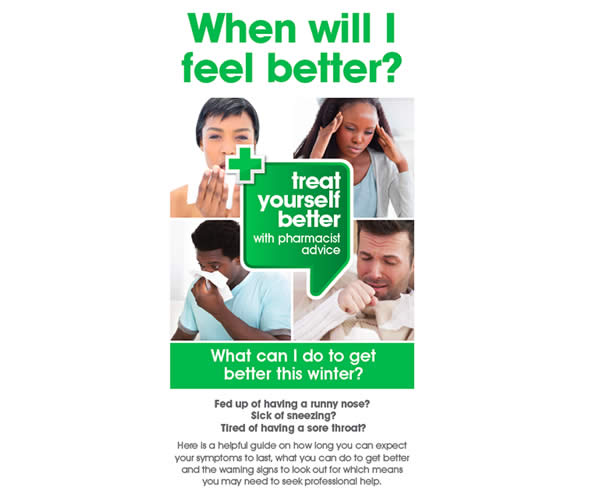We all know how frustrating it can be when you get struck down with a cough, cold, sore throat, flu or even nasal congestion.
It can make you feel rough and impact on your day-to-day lifestyle. Booking an appointment with your GP might seem like the best option,
but in most cases you can save yourself the hassle and pop into your local pharmacy instead.
Martin Todd of the Men’s Health Forum says: “The stats show that men don’t visit their GPs as often as women and are more likely to go soldier on and go to work when ill,
but all the same a surprising number of us take time out of our already busy schedules to visit the GP or even A&E.
It’s not necessary. A visit to your local pharmacist can be quick, convenient and more effective since often they don’t need antibiotics and other drugs that only a doctor can prescribe.
Your pharmacist can advise on how easy it can be to treat coughs and colds at home.”
Below Pharmacist Raj Patel answers your key questions about cold and flu.
1. I’ve always headed to my GP when I am suffering with cold and flu symptoms, isn’t this the right thing to do?
35% of men who admit to visiting their GP for a cold say that they made the trip because the thought they needed antibiotics.i What a lot of people don’t know is that antibiotics aren’t actually effective at treating coughs, colds and sore throats and over prescribing of antibiotics can cause bugs to become resistant. When you do them need to treat an infection, they may not work.
2. My family has used the same doctor for years and I am more comfortable visiting my GP than talking to a stranger, why should I see a pharmacist?
On average, men said they wait less than 5 minutes to see their pharmacist for cold and flu compared to a 3 ½ day wait just for a GP appointment. 18% even reported waiting more than a week. Just think of all the time you’ll save so you can spend more time doing the things that really matter to you rather than sitting in a doctor’s surgery.
3. Don’t pharmacists just dish out medicines that have been prescribed by my GP? Will they really be able to give me personalised advice?
Pharmacists train for 5 years and whilst we are qualified to dispense prescription medicines, we can also provide you with specific treatment advice for your individual symptoms and recommend which over-the-counter medicines will be best for you. If your symptoms are more serious, we can advise you on whether you need to see your GP.
4. I’m in full time employment therefore it’s really difficult for me to get away from work to even speak to a pharmacist for advice.
I tend to just put up with my symptoms, do you have any suggestions?
When you work full time or are self-employed, it can be difficult to find time to pop into a pharmacy. However, a lot of pharmacies do now have extended opening hours (often open until 7pm on selected days of week) and pharmacies within supermarkets tend to be open later as well (some as late as 10pm). Click here to find your nearest pharmacy and check the opening times so that you can find a time which won’t disrupt your working day.
5. I’ve been suffering with a cold for around five days, and whist I don’t think it is serious, I am pretty fed up surely now it is time to go to my GP for antibiotics?
Having a cold for around 5 days can be really frustrating and make you feel pretty rough, however, what a lot us aren’t aware of is that it’s very normal for a cold to last up to 1 ½ weeks. The majority of colds are caused by a virus, therefore no matter how long you’ve had symptoms for, antibiotics won’t help. Next time you pass your local pharmacy, pop in and ask the pharmacist for advice. If you are concerned your symptoms are more serious check out the warning signs [here] which indicate you might need to see your GP.
6. How long can I expect other symptoms such as flu, nasal congestion, a sore throat or cough to last?
Symptoms will last for longer than you might think. An ear infection can last for up to 4 days, a sore throat can cause discomfort for 1 week, flu for 2 weeks, nasal congestion up to 2 ½ weeks and a cough can last up to 3 weeks. If symptoms persist for longer than these time periods then you might need to visit your GP.
7. What can I do at home to beat cold and flu symptoms?
Take comfort at home if you are suffering with cold and flu symptoms and take advantage of the sofa. Drink plenty of fluids and use the opportunity to catch up on some TV. You may find that jumping in your shower pod or bath will help ease congestion. If your temperature is high, try taking a paracetamol or ibuprofen. Lozenges can help with sore throats and it is also helpful to cut back on smoking to avoid irritating your throat any further. If your symptoms persist, it is always worth taking 5 minutes to talk to your pharmacist for advice.
8. Where can I find out more information?
For advice on how long common winter symptoms should last for and for expert advice on self-treating cold and flu symptoms, with the help of your pharmacist, check out the Treat Yourself Better website at www.treatyourselfbetter.co.uk




